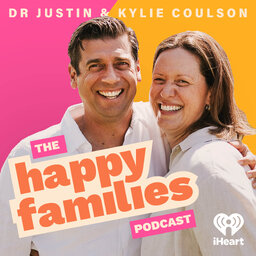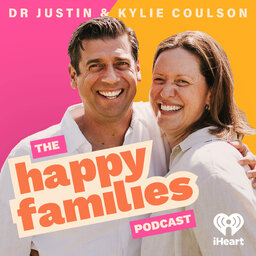#1150 - From 'Mid' to Meaningful: 5 Questions That Get Kids Talking
Ever feel like you’re stuck in the loop of “How was your day?” and hearing “meh” in response? Justin and Kylie share research-backed strategies for having meaningful conversations with your children, including five core questions that build emotional intelligence and resilience. Learn why timing and technique matter more than the questions themselves, and discover how these conversations can significantly reduce anxiety and depression in children.
Key Points:
- The power of well-timed, meaningful conversations
- How conversations build executive function and emotional regulation
- The connection between parent-child discussions and mental health
- Why traditional questions often fail to engage kids
- The importance of timing and technique in family discussions
Research Highlights:
- Harvard's Center on the Developing Child: Back-and-forth conversations build executive function
- Minnesota longitudinal study: Regular meaningful conversations improve emotional intelligence
- Arizona State University: 48% lower rates of anxiety and depression in kids who have regular meaningful discussions with parents
Quote of the Episode:
"Sometimes when we're having difficult conversations, we handle the conversations better if we're actually doing something side by side." - Kylie Coulson
The Five Core Questions:
1. What are some things you're most excited about for 2025?
2. Is there anything you're nervous or worried about this year?
3. What's something you'd love to learn or try this year?
4. When do you feel most like you?
5. What qualities do you admire in others and which ones would you like to develop in yourself?
Key Techniques:
- The WAIT Principle (Why Am I Talking?)
- Using strategic silence
- The power of "Tell me more"
- Avoiding problem-solving unless asked
- Side-by-side conversations
Best Times for Conversations:
- During dinner
- Bedtime
- Walking together
- Car rides
- Over breakfast
Resources Mentioned:
- Harvard's Center on the Developing Child research
- Minnesota longitudinal study
- Dr. Suniya Luther's research at Arizona State University
- happyfamilies.com.au
Action Steps for Parents:
1. Choose the right timing for conversations
2. Practice the WAIT principle
3. Use side-by-side activities for difficult discussions
4. Create regular conversation opportunities at dinner
5. Focus on listening rather than problem-solving
 Dr Justin Coulson's Happy Families
Dr Justin Coulson's Happy Families


